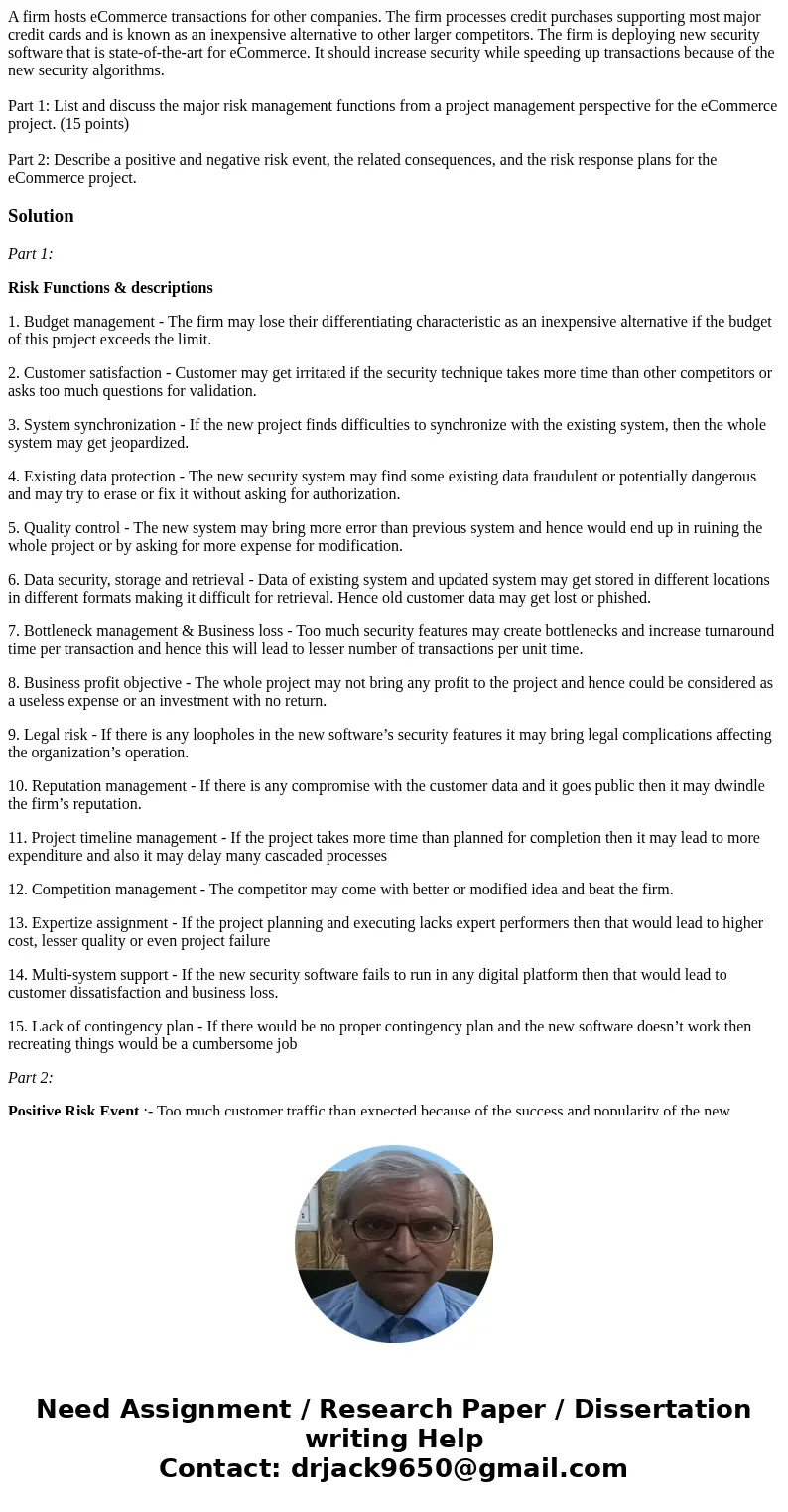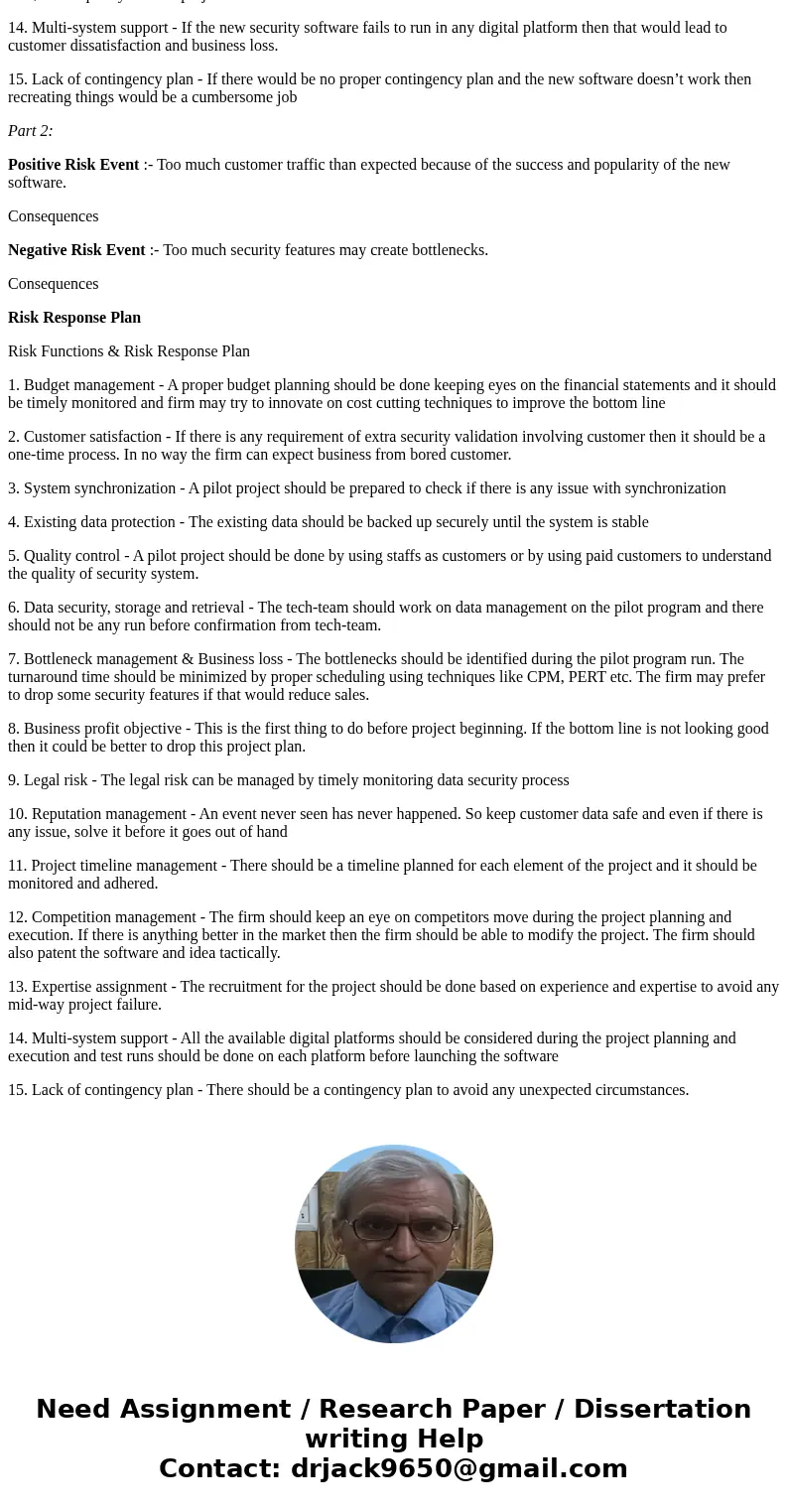A firm hosts eCommerce transactions for other companies The
A firm hosts eCommerce transactions for other companies. The firm processes credit purchases supporting most major credit cards and is known as an inexpensive alternative to other larger competitors. The firm is deploying new security software that is state-of-the-art for eCommerce. It should increase security while speeding up transactions because of the new security algorithms.
Part 1: List and discuss the major risk management functions from a project management perspective for the eCommerce project. (15 points)
Part 2: Describe a positive and negative risk event, the related consequences, and the risk response plans for the eCommerce project.
Solution
Part 1:
Risk Functions & descriptions
1. Budget management - The firm may lose their differentiating characteristic as an inexpensive alternative if the budget of this project exceeds the limit.
2. Customer satisfaction - Customer may get irritated if the security technique takes more time than other competitors or asks too much questions for validation.
3. System synchronization - If the new project finds difficulties to synchronize with the existing system, then the whole system may get jeopardized.
4. Existing data protection - The new security system may find some existing data fraudulent or potentially dangerous and may try to erase or fix it without asking for authorization.
5. Quality control - The new system may bring more error than previous system and hence would end up in ruining the whole project or by asking for more expense for modification.
6. Data security, storage and retrieval - Data of existing system and updated system may get stored in different locations in different formats making it difficult for retrieval. Hence old customer data may get lost or phished.
7. Bottleneck management & Business loss - Too much security features may create bottlenecks and increase turnaround time per transaction and hence this will lead to lesser number of transactions per unit time.
8. Business profit objective - The whole project may not bring any profit to the project and hence could be considered as a useless expense or an investment with no return.
9. Legal risk - If there is any loopholes in the new software’s security features it may bring legal complications affecting the organization’s operation.
10. Reputation management - If there is any compromise with the customer data and it goes public then it may dwindle the firm’s reputation.
11. Project timeline management - If the project takes more time than planned for completion then it may lead to more expenditure and also it may delay many cascaded processes
12. Competition management - The competitor may come with better or modified idea and beat the firm.
13. Expertize assignment - If the project planning and executing lacks expert performers then that would lead to higher cost, lesser quality or even project failure
14. Multi-system support - If the new security software fails to run in any digital platform then that would lead to customer dissatisfaction and business loss.
15. Lack of contingency plan - If there would be no proper contingency plan and the new software doesn’t work then recreating things would be a cumbersome job
Part 2:
Positive Risk Event :- Too much customer traffic than expected because of the success and popularity of the new software.
Consequences
Negative Risk Event :- Too much security features may create bottlenecks.
Consequences
Risk Response Plan
Risk Functions & Risk Response Plan
1. Budget management - A proper budget planning should be done keeping eyes on the financial statements and it should be timely monitored and firm may try to innovate on cost cutting techniques to improve the bottom line
2. Customer satisfaction - If there is any requirement of extra security validation involving customer then it should be a one-time process. In no way the firm can expect business from bored customer.
3. System synchronization - A pilot project should be prepared to check if there is any issue with synchronization
4. Existing data protection - The existing data should be backed up securely until the system is stable
5. Quality control - A pilot project should be done by using staffs as customers or by using paid customers to understand the quality of security system.
6. Data security, storage and retrieval - The tech-team should work on data management on the pilot program and there should not be any run before confirmation from tech-team.
7. Bottleneck management & Business loss - The bottlenecks should be identified during the pilot program run. The turnaround time should be minimized by proper scheduling using techniques like CPM, PERT etc. The firm may prefer to drop some security features if that would reduce sales.
8. Business profit objective - This is the first thing to do before project beginning. If the bottom line is not looking good then it could be better to drop this project plan.
9. Legal risk - The legal risk can be managed by timely monitoring data security process
10. Reputation management - An event never seen has never happened. So keep customer data safe and even if there is any issue, solve it before it goes out of hand
11. Project timeline management - There should be a timeline planned for each element of the project and it should be monitored and adhered.
12. Competition management - The firm should keep an eye on competitors move during the project planning and execution. If there is anything better in the market then the firm should be able to modify the project. The firm should also patent the software and idea tactically.
13. Expertise assignment - The recruitment for the project should be done based on experience and expertise to avoid any mid-way project failure.
14. Multi-system support - All the available digital platforms should be considered during the project planning and execution and test runs should be done on each platform before launching the software
15. Lack of contingency plan - There should be a contingency plan to avoid any unexpected circumstances.


 Homework Sourse
Homework Sourse